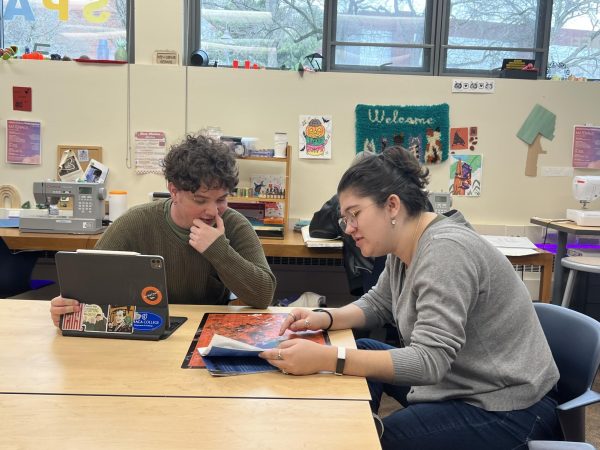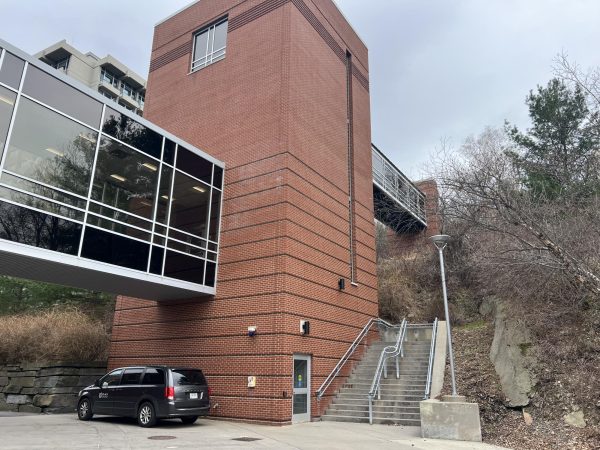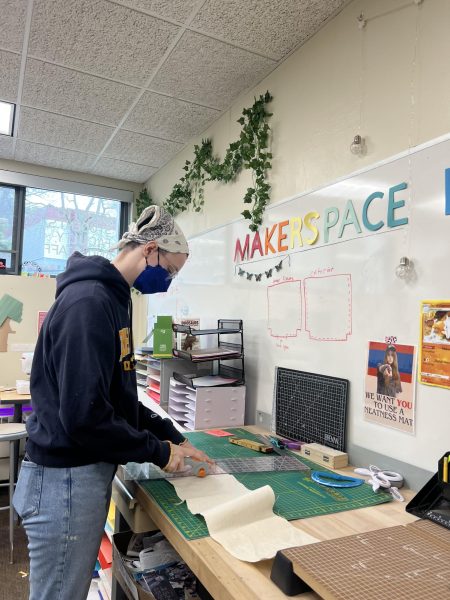Oak Weihing, a junior at IC, founded the Disabled Students’ Alliance (DSA) in 2024. The club has grown to about 60 members and has become a hub for support, advocacy, and connection.
“Our main goal was just to be a source of community for disabled people,” Weihing said. “A place to meet people and to have low expectations of how often people need to be there or how much effort they need to put in.”
First-year student Gillian Fletcher said DSA helped her adjust to campus after moving five hours from home.
“Having people who I can talk to – ‘like man, it really sucks that this elevator’s down,’ or like, ‘man, I hate when professors say this, or when other students do this,'” Fletcher said. “It’s encouraging and makes me feel connected to people who understand me.”

As accessibility threatens to become a dangerous word, students with disabilities at Ithaca College continue to shine a light on their needs. College staff say they’re doing the best they can to keep up.
A world of barriers
DSA members say they face various challenges, from campus terrain to being denied accommodations.
“The campus is literally built on a hill. It’s a little unavoidable,” Weihing said. “We have one elevator [Baker Walkway] that accesses upper campus from lower campus. So, if it breaks, we’re done.”
The group often coordinates rides for one another to navigate mobility barriers. They also pointed to long dining hall lines as an invisible challenge, especially for students with chronic pain or fatigue.
These types of challenges often force students to weigh whether accommodations are worth the social judgment that could follow.
“I can’t stand up for extended periods of time, so that’s just not viable for me,” Weihing said. “Could I get an accommodation for that? Maybe. But I don’t want to have people like, ‘Well, why do you get to cut the line?'”

Academic accommodations are another common issue.
“There are people that refuse to follow accommodation plans,” Weihing said. “One that a lot of professors struggle with is flexible attendance.”
DSA members also said that the documentation requirements for Student Accessibility Services (SAS) leave many without support. Testing and diagnosis can be expensive, come with long wait times, and be challenging to access, especially for those with invisible disabilities.
“Without documentation, it’s basically like you’re not disabled,” Fletcher said.
The DSA also reported that accommodation requests must be resubmitted each semester and are usually only accepted from medical doctors. A psychiatrist, they said, rarely counts.
Inside Student Accessibility Services
Brenda Wickes, acting director of SAS, said her office follows federal law, Section 504 and the Americans with Disabilities Act, to provide individualized accommodations.
“Students aren’t granted or approved for accommodations based on diagnosis,” Wickes said. “It’s based on their barriers in this environment.”
Weihing says this often creates limitations.
“They are bound by disability law, which is limiting,” they said. “Most students that I’ve talked to have felt like every time they interact with SAS, it’s a fight.”
Wickes said 20% to 25% of IC’s student body receives accommodations, citing that’s well above the national average.
Wickes said the office works with other departments to meet student’s needs, including housing, dining and academics. Academic support is provided through campus-wide services such as the Center for Student Success, not SAS directly.
“Students at IC are students at IC,” she said. “We don’t want to create these narrow pools of support for folks when they can have access to broader, more rigorous and healthy support systems.”
She also noted that professors have the right to deny specific accommodations, such as flexible attendance, if it conflicts with the course’s structure, like in discussion or lab-based classes.
Outside of their control
Wickes acknowledged major gaps.
“I would love to see transportation for students with disabilities,” she said. “We don’t have that – not even for temporary disabilities.”
She also said IC lacks a dedicated SAS testing space, expressing how the office needs to room-hunt during finals week.
“So many students depend on it,” she said. “It’s not as robust of a support as I would like to see it.”
Wickes said that requests for improvements, such as transportation, accessible redesigns or a testing center, are submitted through the college’s capital fund. This fund is managed by a department collaborating with alums and other donors to raise money for institutional priorities.
Calls for a disability center
The DSA is pushing for a Center for Disability – a student-focused space modeled after the BIPOC Unity Center and LGBTQ+ Center. Weihing said the hypothetical center would employ staff and distribute educational materials – a responsibility the DSA said it does not want to take on alone.
“We’re unpaid students,” Weihing said. “We do not have to keep being the ones to bear it all.”

“We’ve been working with SAS and higher-ups over at the college… we’ve had some meetings, but it currently doesn’t seem like it’s really going anywhere,” they added. “SAS has no more control over this than we do. It’s a bigger college thing.”
Wickes said SAS supports the idea but further expressed that they can’t control its implementation.
Campus concerns and transparency
Students said the college’s lack of transparency in the face of a federal diversity investigation has made them uneasy. Departments have reportedly been discouraged from speaking publicly.
“Not only are they not talking to journalists – they’re not talking to us,” Fletcher said. “It’s very concerning because this is the kind of stuff we see in non-free countries.”
Still, some understand the college’s silence.
“I’d rather the college refuse interviews than talk and risk more funding cuts,” said DSA secretary and senior Nico Trautman.
History as a warning
Joanie Groome, an adjunct professor in health sciences and public health, said national human service budget threats worry her. She’s taught a disability awareness class for over 20 years and believes young people must be educated.
“As much as I don’t want to believe this or say this, history can repeat itself,” Groome said. “Our history is really shameful and horrible.”
She said her course, which pairs students with children with disabilities at the Rackers Center through a swim program, is one way to build empathy and understanding across majors. But she wants to see broader change.
“There’s no curriculum-wide disability awareness in our schools at any level, not elementary, not high school, and not college,” Groome said. “That needs to change.”






